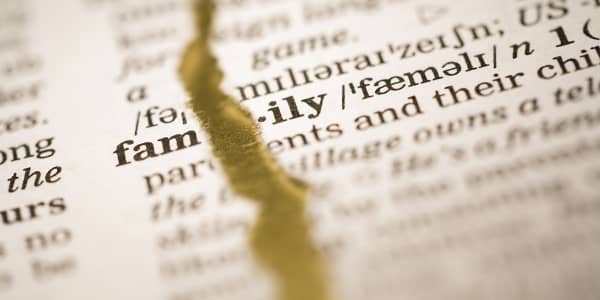Legendary ties that no longer bind
The old adage says to never do business with friends or family. When negative personal feelings seep into business dealings, keeping such matters separate has almost always proved difficult—especially when it comes to blood relatives. And when the business is large, the disputes tend to be large as well. So does the publicity.
Here, we look at some of the most famous family business feuds of the last century. From the breakup to the makeup and everything in between, here are some of the most famous familial fracases.
—By Constance Parten, senior producer
Originally posted Jan.31, 2011; updated Oct.10, 2014
Puma and Adidas
Brothers Adolf and Rudolf Dassler founded a shoe company in their mother's laundry room in the town of Herzogenaurach, Germany, in 1924. But it soon became apparent that the siblings had different personalities, and tensions between the two came to a boiling point during World War II.
Rudolf was sent to the front and, after his return, was picked up by U.S. soldiers and imprisoned for about a year. He reportedly was convinced that his imprisonment was orchestrated by his brother. The brothers split in 1948, and Rudolf Dassler founded the company that would become Puma. Adi formally registered Adidas in 1949. The rivalry between the brothers even divided the town of Herzogenaurach, where Adidas and Puma still have rival factories on opposite sides of the river. (Rudolf died in 1974 at age 76, Adolf in 1977 at 78; never reconciled, they were reportedly buried at opposite ends of the same cemetery.)
The feud came to a symbolic end on Global Peace Day in 2009, though, when employees of both factories played football together, pitting mixed Puma and Adidas teams against each other. The “Black” team of the companies' CEOs beat the “White” team 7:5.
Source: National Public Radio, peace.puma.com
Tory and Chris Burch
Fashion designer Tory Burch famously fell out with her ex-husband, and co-founder of her eponymous clothing brand, Chris Burch twice: First on a personal level back in 2006, when they divorced three years after founding her company and a decade after they wed, and then again—professionally—in late 2012, when the two sued and countersued each other.
Chris initiated the legal tussle with a suit for "breach of contract and interference with the sale of his shares of the company." (Each owned a 28.3 percent stake in Tory Burch LLC, which boasts annual sales of more than $800 million.) He reportedly wanted to sell his holdings and move on top focus on the new C. Wonder stores he'd founded. Tory parried that legal joust with claims Chris was infringing on her distinctive business model with the very similar C. Wonder product. The erstwhile couple hashed out their professional, if not personal, differences in early 2013, agreeing to settle all pending legal claims against one another. Chris reportedly sold half his shares in his ex-wife's company but still retained a 15 percent stake—perhaps unintentionally doing Tory a favor: The sale made her a billoinaire.
Sources: Vanity Fair, US Weekly
Larry and Jimmy Flynt
Brothers Larry and Jimmy Flynt (left and right, respectively) battled it out in a U.S. District Court in Ohio back in 2011 after Jimmy claimed the infamous "Hustler" porn empire belonged as much to him as to his more famous older brother.
According to Cincinnati.com, which coveried the trial, the Flynts had had a falling out several years before "after Larry fired Jimmy's two sons, severed ties to his brother and tried to evict him from the Hustler store he runs in downtown Cincinnati." Jimmy responded with a lawsuit claiming he was a full partner in the family business, entitled to half of Hustler's assets. He lost.
The Flynt brothers have reportedly not spoken since, so there's no word on Jimmy's take on Larry's plans to possibly take Hustler parent company Larry Flynt Publications public within 12 to 18 months. Despite Jimmy's post-trial exile, Hustler remains a family business, with Larry's fifth wife, Elizabeth Berrios, serving as a vice president and his daughter Teresa as chief marketing officer.
Sources: Cincinnati.com, USA Today
Mukesh and Anil Ambani
The world's richest siblilngs, Mukesh Ambani (right) and Anil Ambani (left)—the former (and elder) is the owner of the world's most expensive residential property, the $1 billion Antilia complex in Mumbai, India—settled a rift in May 2010 by ending noncompetition agreements that had been a source of bitter dispute for years.
The billionaire brothers from India said they were ending accords completed in January 2006 that barred them from competing across their business interests. Mukesh runs Reliance Industries, and Anil leads the Anil Dhirubhai Ambani Group. Reliance Industries has agreed not to enter the commercial generation of electricity from natural gas until March 31, 2022.
In the years since the brothers split their father's company, their battle over the price of natural gas from Reliance Industries assets halted plans for a major north Indian power plant. A merger between Anil Ambani's Reliance Communications and MTN Group of South Africa was scuttled after Mukesh Ambani said he had the first right to buy shares in his brother's company.
Whatever the current state of their business relationships, the Ambani brothers put any lingering differences at least temporarily aside to jointly throw their mother a lavish 80th birthday bash last February.
Source: The New York Times, Daily Mail
The Gucci Family
Although the Gucci family started producing leather goods in Italy in the 15th century, today's famous Gucci brand was founded in a saddlery in Florence by Guccio Gucci in 1906. His sons, Aldo and Rodolfo, later took over the company, growing it exponentially. But financial scandals and family infighting led to considerable adverse publicity over the years.
The family disputes included suits filed by Paolo Gucci against his father, Aldo, other relatives and the company. Countersuits were filed by the defendants, in part to prevent Paolo, a designer, from issuing a competitive leather line with the Gucci name. Paolo Gucci's suits were dismissed in 1980.
Split by the bitter fights for control of their high-fashion retail empire, Gucci family members eventually sold nearly a 50 percent interest in Guccio Gucci S.p.A. to a Middle Eastern investment banking firm in 1988. The Gucci Group is today owned by French multinational company Kering.
Source: The New York Times
Harrison and Wallace McCain
In 1957, Harrison (left) and Wallace (right) McCain founded McCain Foods with the support of their brothers Robert and Andrew.
The brothers opened a French fry processing plant in their hometown of Florenceville, in western New Brunswick, Canada, less than 10 miles from the U.S. border. They ultimately became the world's largest producer of frozen French fries.
As co-founders of the multinational food company, Harrison and Wallace worked side by side for 37 years. Their offices were even linked by an unlocked door. But things changed in 1993, when Wallace, over his brother's objections, appointed his own son Michael to head McCain U.S.A. in Chicago. By 1994, Wallace had been forced out of McCain Foods, although he remained one-third owner.
The power struggle split family loyalties, and some of the clan went with Wallace to run Maple Leaf Foods, one of Canada's largest food processors. The brothers remained estranged until, as Harrison neared death in 2004, Wallace began to visit his ill brother. Wallace himself passed away at age 81 in May 2011.
Sources: The New York Times, The Globe and Mail, mapleleaf.com
Curtis and Prestley Blake
"Two straws and one chocolate Fribble were all it took to bring together Friendly's founders Prestley and Curtis Blake," according to The Boston Globe. The brothers met up at a Florida Friendly's in February 2010 to share the super-thick soft-serve milk shake and reminisce about the ice-cream shop they founded in 1935 using $547 from their parents.
For decades, the relationship between the Blake brothers fit their family-friendly restaurant. But a few years ago the brothers were involved in a public feud over the future of the company before it was sold to private-equity firm Sun Capital Partners.
Former company president Curtis accused treasurer Prestley's spending habits for stifling Friendly's, which would be sold to restaurant executive Ronald Smith in a deal that strapped the company with enormous debt. Prestley later became Friendly's second-largest stakeholder. Both brothers were saddened that the company tore them apart but are trying, at least publicly, to make amends.
Source: The Boston Globe
The Koch Family
"In the annals of family feuds, the slugfest of the Koch family of Kansas is one of the biggest, meanest and longest-running." That's how The New York Times described the family rift that led to a protracted court case. The legal battle itself stemmed from a 1983 settlement between William and two of his brothers, Charles (left) and David (center) Koch. That settlement gave William (right); another brother, Frederick; and a number of Koch cousins $1.1 billion in return for their 5.5 million shares in Koch Industries, which takes in more revenue than such corporations as Microsoft, Walt Disney or Merrill Lynch.
William contended that the group was shortchanged in that 1983 deal and pressed the case through 25 Federal and state courts until a verdict was decreed against him in 1999. He was seeking another $62 a share, or $339 million in 1983 dollars, for the group's holdings. Court documents he filed estimate that interest would bring this to more than $2 billion.
After 10 weeks of testimony and two days of deliberations, a federal jury found William was owed nothing by his brothers Charles and David, who almost entirely own Koch Industries, a $35 billion oil conglomerate in Wichita, Kansas, that is the nation's second-largest private company after Cargill.
Source: The New York Times
Darryl McCauley and Dane Cook
Darryl McCauley (left) worked for his half-brother, comedian Dane Cook, as a business manager from the early 1990s until December 2008. In 2008, Cook accused McCauley and his wife of stealing more than $11 million from the comedian's company, Great Dane Enterprises. McCauley pleaded guilty in October 2010 to 27 counts of larceny over $250, three counts of forgery, embezzlement and other charges and was sentenced to five to six years in prison. He also faces 10 years of probation after his release.
McCauley was convicted of stealing money from Cook's business and personal accounts between 2004 and 2008 by transferring funds to his own accounts. In one instance, he forged a check for $3 million dollars, written to himself.
McCauley’s wife, Erika, also faced criminal charges, including larceny and receiving stolen property. She pleaded guilty to charges of larceny and conspiracy to commit larceny and was sentenced to up to three years in prison with a concurrent probationary period of 13 years.
Source: The Boston Globe
Gordon Ramsay and Chris Hutcheson
British celebrity chef Gordon Ramsay's personal life was splashed through the tabloids in late 2010 after a big argument with his father-in-law went public. Ramsay ended his professional relationship with Chris Hutcheson in October of that year when he fired him as chief executive of his company, Gordon Ramsay Holdings.
Angry, Hutcheson is reported to have called Ramsay a "monster" who tried to turn his daughter, Tana, against him. Ramsay followed up with a public letter condemning Hutcheson, calling him a "dictator." The British tabloids made plenty of hay from the rift, but by mid-January of 2011, Ramsay appeared ready to end the dispute, reportedly telling U.K. tabloid The Mirror that he'd "made mistakes, but I've learned from them," and "don't mix family business with pleasure."
The pair settled their business differences with a $3.25 million payout to Hutcheson, although Ramsay reportedly got back more than $400,000 after his personal emails and company computers were hacked. And the truce didn't last very long. By spring 2013, Ramsay was again blasting "evil" Hutcheson's morals and alleging that his signature had been fraudulently added to the lease of a north London pub property by a mysterious "ghost-writing" machine while Hutcheson was still at the helm of Gordon Ramsay Holdings.
Source: The Mirror, The Independent, Metro UK
Sumner and Shari Redstone
Back in 2006, stories of a rift between Viacom chairman Sumner Redstone and his children, Brent and Shari, began surfacing in the media. Brent, who filed suit against his father in 2006, asserted he was entitled to a stake of more than $1 billion in National Amusements, the family company his father used to control shares in Viacom and his other enterprises. Brent ultimately dropped the suit in February 2007. But Sumner also was reported around that time to have soured on his daughter, Shari, whom he had groomed as his successor.
Sumner—at age 91 reportedly still the highest-paid executive in entertainment—played down the reports of the tensions with his daughter, telling The New York Times in July 2007 that he had "no intention of removing her from the board. I haven't encouraged her to take a lesser role, and I consider her a credible candidate to succeed me, but I believe the board should pick my successor."
Many published reports portrayed the split as so deep that Shari would ultimately leave the board. She didn't. Shari remains president of National Amusements—with a reported 20 percent share to her father's 80 percent—and vice chairman of both the CBS and Viacom boards. As the years have progressed, Sumner Redstone seems to have settled on his daughter as his logical heir and successor.
Source: The New York Times, National Public Radio, Variety, The Wall Street Journal






